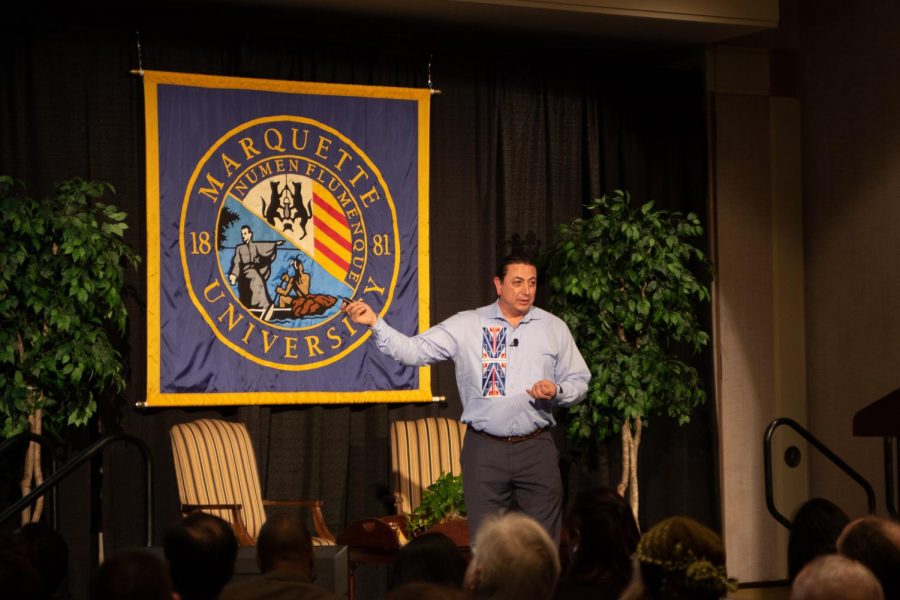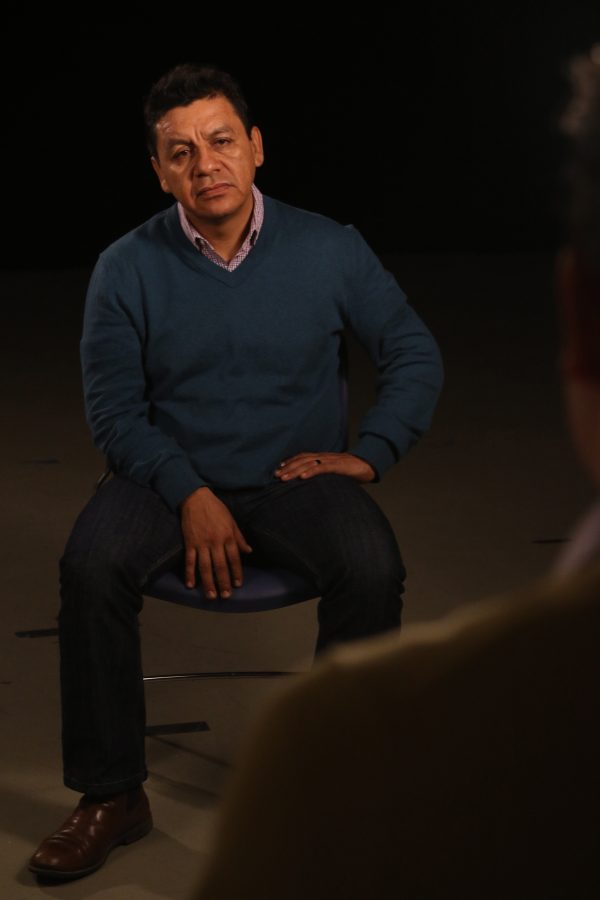Standing Rock chairman and Dakota Access Pipeline protest activist David Archambault II visited Marquette University Feb. 6 to give an address titled ““Standing with Tribes — Past, Present and Future.”
His visit was a partnership between Mission Week, The Marquette Democracy Project and the Marquette Forum.
Archambault spoke about the history of Native Americans and their land, and how it was slowly taken away from them—even in modern times. He spoke about activism beginning at a grassroots level, how the Standing Rock protests against the oil industry and federal government began, how the protesters went about fighting it and how he came away from it.
Throughout 2016 and 2017, those of the Standing Rock reservation began protesting the construction of The Dakota Access Pipeline, an underground oil pipeline running through several U.S. states. The project was intended to run through sacred lands of Native Americans. Along with his experience as an activist, Archambault also spoke about the environmental impacts of fossil fuels.
“We pay the cost, and we continue to pay the cost,” Archambault said of economic progress and infrastructure, specifically the Dakota Access Pipeline. “It’s going to change the way we live,” he said. “With peace and prayer, we are able to find ways not to forget, but to try to forgive and to try to heal.”
The Democracy Project was the organization that originally reached out to Archambault. The Democracy Project was put together by Jessica Rich, assistant political science professor, Barrett McCormick, political science professor and coordinator of the interdisciplinary undergraduate major in international affairs, and Joe Brown, assistant professor of digital media and performing arts.
“It’s a project that brings human rights activists from around the world to Marquette, not just for a public lecture, but also to spend an entire two days on campus, in which they visit a class and which a digital media class records an interview with them,” Rich said.
Rich said the interviews are then cut down into segments and put onto The Marquette Democracy Project website for educators around the world to learn more about activism.
“It’s been a really fun project. The public lecture is only one piece. It’s the most visible piece,” Rich said.
Rich said she originally thought of inviting Archambault in spring 2017 in the midst of the Standing Rock pipeline protests. She said she passed the invitation through a Minneapolis Star Tribune journalist who had previously wrote an article on the protests.
“I explained the project with the journalist, who thought the project was cool and then passed it on to the tribal council,” Rich said. “I then heard nothing from them, probably because they were in the middle of the chaos of these protests, and he reached back out to me about six months later saying that, if I was still interested, he’d be interested in coming to Marquette.” The Marquette Democracy Project then partnered with Mission Week and the Marquette Forum. Marquette’s Native American Student Association was also involved in Archambault’s visit.
“I was notified by our organization’s adviser as soon as they learned about the finalized plans, and so they made plans for us to host him around campus,” said Alex Liberato, co-president of NASA and sophomore in the College of Business Administration.
Liberato said that after meeting Archambault, they went to the Marquette vs. St. John’s basketball game. The next day, NASA had a private reception before the event. Liberato introduced Archambault at the event, which he said he thinks there were around 200 people in attendance.
“It was a really nice crowd and he did an amazing speech,” Liberato said. “They all were very receptive to him. They all listened very attentively to him.”
Liberato said he was impressed by Archambault in many ways.
“He had come for a small meeting with myself, my organization and a couple people in the intercultural community and we were just really refreshed by how down to Earth he was, while being somebody with such an accomplished resume,” Liberato said. “We were really honored to be in his presence.”
Rich said Archambault is a wise, grounded and reflective person.
“All the students he came and visited were quite impressed with his ability to really understand the broader picture of what was happening, with not only the broader historical picture of encroachment of tribal lands and threats to the environment, but also with the broader picture of politics and how the protests developed,” Rich said.
Rich said she thinks the conversations Archambault had with students had a lasting impact.
“I hope they came away with a better and deeper understanding of tribal communities and the broader range of issues that they face and of the long history, not only of environmental devastation, but of broken promises to their people, (and) with a better understanding of how one resists these kinds of pressures and how you go about fighting back,” Rich said.
Liberato said Archambault is a man who has seen it all.
“What I found to be most compelling was just how much he put forth for the Standing Rock Sioux in their time of peril. Everything he could do, he did,” Liberato said.




Brien Doyle • Feb 14, 2019 at 8:03 pm
The Bible is a compendium of fire side tales and fables,
recounted orally for generations by goat herders and primitive tribes from the stone age, until writing was invented,
and then again many different sources, transliterations, and versions were copied and written down.
There were no grand central universities to organise the many various versions of these origin/creation stories, stories common to most primitive cultures.
They were for entertainment (as in all migratory camp tribes),
and to answer the questions of the many fears and mysteries of our universe, like ‘thunder’ and earthquakes, since there was no science yet.
This is the old Testament.
The ‘new’ Testes is also hearsay since these letters, ‘gospels’ and stories were written by the loyal faithful, the camp followers,
not by objective historians at that particular time,
or by any contemporary writers,
and these tales were written many years after the supposed events of this mythical Jesus.
Thus, there is no verifiable evidence of a Jesus in real documented history.
Then, many of these stories, but not all, as many were not chosen,
[ There are more than just four Gospels but only these four were agreed on ],
were compiled for one self-absorbed converted Roman Emperor in his Nicean Council,
for his expressed purpose of conquest and
control of the people of Europe for his Holy Roman Empire.
He recognised that this was the perfect religion/mythology for the future domination of the populaces.
Half of the stories were ignored by the Nicean Bishops and none have been proven to be based on fact.
This ‘Bable’ book is backed up by absolutely no facts and no evidence.
It is not proof for any god(s) ….(or of any jesus…)
It is a historical novel…Only!
The Bible is proof of a book ONLY (certainly not evidence of any gods…)